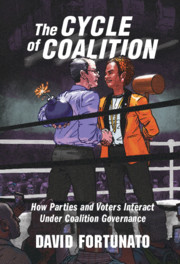36 results
Public Support for Professional Legislatures
-
- Journal:
- State Politics & Policy Quarterly / Volume 23 / Issue 3 / September 2023
- Published online by Cambridge University Press:
- 18 April 2023, pp. 327-339
- Print publication:
- September 2023
-
- Article
-
- You have access
- Open access
- HTML
- Export citation
Do Women Make More Protectionist Trade Policy?
-
- Journal:
- American Political Science Review / Volume 117 / Issue 4 / November 2023
- Published online by Cambridge University Press:
- 20 January 2023, pp. 1522-1530
- Print publication:
- November 2023
-
- Article
-
- You have access
- Open access
- HTML
- Export citation
The Politics of Police Data: State Legislative Capacity and the Transparency of State and Substate Agencies
-
- Journal:
- American Political Science Review / Volume 117 / Issue 1 / February 2023
- Published online by Cambridge University Press:
- 20 July 2022, pp. 280-295
- Print publication:
- February 2023
-
- Article
-
- You have access
- Open access
- HTML
- Export citation

The Cycle of Coalition
- How Parties and Voters Interact under Coalition Governance
-
- Published online:
- 07 July 2021
- Print publication:
- 17 June 2021
5 - Costs of Coalition Compromise
-
- Book:
- The Cycle of Coalition
- Published online:
- 07 July 2021
- Print publication:
- 17 June 2021, pp 61-90
-
- Chapter
- Export citation
Frontmatter
-
- Book:
- The Cycle of Coalition
- Published online:
- 07 July 2021
- Print publication:
- 17 June 2021, pp i-iv
-
- Chapter
- Export citation
4 - Perceptions of Coalition Compromise
-
- Book:
- The Cycle of Coalition
- Published online:
- 07 July 2021
- Print publication:
- 17 June 2021, pp 40-60
-
- Chapter
- Export citation
9 - Pushing Forward
-
- Book:
- The Cycle of Coalition
- Published online:
- 07 July 2021
- Print publication:
- 17 June 2021, pp 180-200
-
- Chapter
- Export citation
3 - Parties and Voters under Coalition Governance
-
- Book:
- The Cycle of Coalition
- Published online:
- 07 July 2021
- Print publication:
- 17 June 2021, pp 20-39
-
- Chapter
- Export citation
List of Tables
-
- Book:
- The Cycle of Coalition
- Published online:
- 07 July 2021
- Print publication:
- 17 June 2021, pp viii-ix
-
- Chapter
- Export citation
Bibliography
-
- Book:
- The Cycle of Coalition
- Published online:
- 07 July 2021
- Print publication:
- 17 June 2021, pp 201-215
-
- Chapter
- Export citation
1 - A Lesson Learned Too Late
-
- Book:
- The Cycle of Coalition
- Published online:
- 07 July 2021
- Print publication:
- 17 June 2021, pp 1-7
-
- Chapter
- Export citation
Index
-
- Book:
- The Cycle of Coalition
- Published online:
- 07 July 2021
- Print publication:
- 17 June 2021, pp 216-226
-
- Chapter
- Export citation
Contents
-
- Book:
- The Cycle of Coalition
- Published online:
- 07 July 2021
- Print publication:
- 17 June 2021, pp v-v
-
- Chapter
- Export citation
List of Figures
-
- Book:
- The Cycle of Coalition
- Published online:
- 07 July 2021
- Print publication:
- 17 June 2021, pp vi-vii
-
- Chapter
- Export citation
8 - Does It Ever Go Right?
-
- Book:
- The Cycle of Coalition
- Published online:
- 07 July 2021
- Print publication:
- 17 June 2021, pp 156-179
-
- Chapter
- Export citation
6 - Collective Responsibility and Differentiation
-
- Book:
- The Cycle of Coalition
- Published online:
- 07 July 2021
- Print publication:
- 17 June 2021, pp 91-120
-
- Chapter
- Export citation
2 - Motivation and Promise
-
- Book:
- The Cycle of Coalition
- Published online:
- 07 July 2021
- Print publication:
- 17 June 2021, pp 8-19
-
- Chapter
- Export citation
7 - What Could Go Wrong?
-
- Book:
- The Cycle of Coalition
- Published online:
- 07 July 2021
- Print publication:
- 17 June 2021, pp 121-155
-
- Chapter
- Export citation
Acknowledgments
-
- Book:
- The Cycle of Coalition
- Published online:
- 07 July 2021
- Print publication:
- 17 June 2021, pp x-xiv
-
- Chapter
- Export citation



